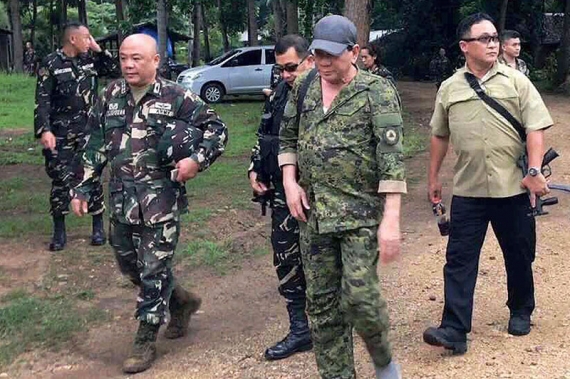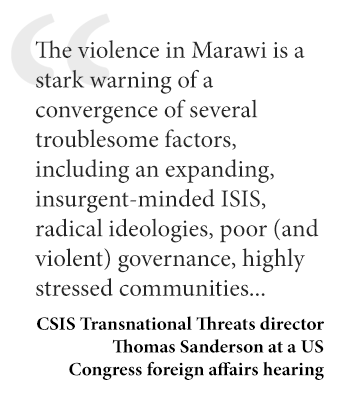Philippines warned: Mindanao seen as new battlefield of regional extremists

President Rodrigo Duterte, second right, wearing a bullcap and an assault rifle slung on his shoulder, walks with other military officers and security men inside the camp of the 2nd Mechanized Infantry Brigade, Light Armored Division, Friday, July 7, 2017 in the outskirts of Iligan city in southern Philippines. PCOO via AP
MANILA, Philippines — Mindanao might be a new battlefield accessible to regional extremists if the Abu Sayyaf Group-Maute coalition holds on to Marawi City, an American analyst said.
Thomas Sanderson, the transnational threats project director at influential think tank CSIS, warned that without a short-term solution to the fighting in Marawi and a long-term solution to problems in Mindanao, ISIS could come to see Mindanao as its primary destination.
The ongoing fighting in Marawi would eventually attract more foreign and local fighters, financial support and media attention, according to Sanderson.
"None of that is good for the security of the Philippine nation, especially local civilians (Muslim, Christian, Buddhist and others) in desperate need of economic development and responsive government," Sanderson said in his testimony before the US House Committee on Foreign Affairs Subcommittee on Asia and the Pacific.
Sanderson noted that the battle in Marawi has become the focal point of activity of the self-proclaimed Islamic State in Southeast Asia as more than 500 militant fighters have joined the fight.
The diversity of nationalities among militant casualties raises alarm in counter-terrorism and counter-insurgency communities.
"Among the roughly 80 foreign fighters thought to have been in the battle, the dead included fighters from Saudi Arabia, Morocco, Chechnya, Yemen, Indonesia, Malaysia," Sanderson said.
RELATED: US analysts: Time not on AFP’s side in Marawi
The use of experienced foreign fighters with battlefield expertise, network, funding and street credibility may bring about an already unstable region and poorly governed territory.
There is also a potential to establish a new caliphate resulting in extremist groups contesting government control, he said.
 "The violence in Marawi is a stark warning of a convergence of several troublesome factors, including an expanding, insurgent-minded ISIS, radical ideologies, poor (and violent) governance, highly stressed communities, returning and regional foreign fighters, accessible funding, criminal activity, and adept use of social media," Sanderson said.
"The violence in Marawi is a stark warning of a convergence of several troublesome factors, including an expanding, insurgent-minded ISIS, radical ideologies, poor (and violent) governance, highly stressed communities, returning and regional foreign fighters, accessible funding, criminal activity, and adept use of social media," Sanderson said.
On the other hand, Counter Extremism Project research analyst Supna Zaidi Peery suggested removing extremist propaganda from the internet and social media platforms.
"First, Southeast Asian governments must formulate policies and work with the private sector to take down extremist propaganda online," Peery said in her testimony.
Such technology allows extremists to fuel radicalization, recruitment and incitement to violence.
Peery stressed that the Philippine government and other regional governments have the opportunity to address the extremist threat churned out by ISIS and other Islamist groups.
"Unchallenged, extremism will continue to spread and be a destabilizing and stigmatizing force for every country where extremist propaganda is allowed to proliferate. The first victims are always peaceful Muslim citizens," she said.
- Latest
- Trending




























